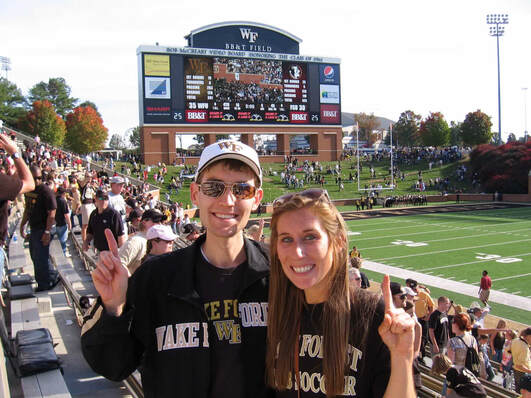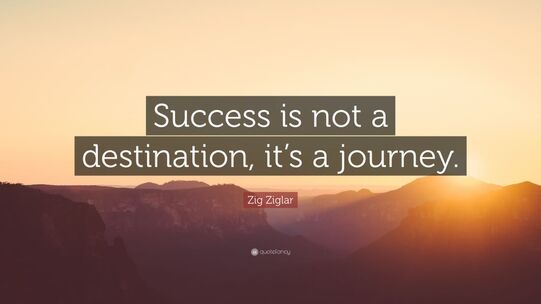- Dave Clawson, Head Coach, Wake Forest University Football
|
Life Advice, Career Development, Opinion, Sports! November brings with it a host of collegiate and professional sports taking place in the United States from American football to basketball and hockey. Being a sports fan is a complex endeavor that can be both painful and joyous. Depending on the resources and talent on your favorite team they may be more or less likely to win games or an eventual championship. But anyone who has watched a few sporting events knows that sometimes (even often) the team that is favored to win doesn't for a variety of reasons including mistakes, luck, and an opponent being better on that day. Winning is both difficult and unpredictable. I grew up as a Wake Forest University Demon Deacon fan as both my parents went there. My sister is also a Wake alumnus and lives near the campus, only a few hours drive from my current home in Southwest Virginia. As such, for the past few years I have been to many Wake games with her and witnessed the highs and lows of fandom. In 2021, the Wake Forest football team won 10 games (out of 12) in the regular season and advanced to the Atlantic Coast Conference (ACC) football championship game. It was an amazing season for a school with the smallest enrollment among institutions competing at the highest level of collegiate football in America. Despite what was objectively one of the best football seasons in Wake Forest HISTORY, there were still 3 losses that took place that year including in the ACC championship game itself with my sister, her boyfriend, our tailgate buddies, and myself present to witness it. That loss in particular still stings. We all know from behavioral economics that losses loom larger than gains and indeed any sports fan can tell you that losses stay with you longer (and eat at you more as you play the "what if" game) than the highs of a win. While 2021 was an amazing football season for Wake Forest, 2023 has been a struggle. A team that has been so offensively gifted the past few years has had a difficult time scoring in 2023. At the college level players graduate and leave and so some variability in results is to be expected. Regardless, watching "your team" make mistakes and struggle is challenging. You can see the players are putting in effort but the results are just not there. You hope they continue to commit to the work of getting better, gelling more as a time (chemistry between the players is important), and realize that next year things can be different. However, a variety of factors in modern day college sports makes commitment of players more elusive than it has ever been. Seismic Changes for American College Sports Landscape The modern college sports landscape has introduced an interesting set of incentives that have cast a spotlight on what an athlete gets from their experience playing for a university. It used to be that an athletic scholarship and the chance to build skills and a resume that made one competitive to be selected to join a professional team (and get paid a professional athlete's salary) was what a prospective college athlete could expect. Now, in the revenue-generating sports of college football and basketball mostly male athletes have the ability to get paid for the use of their name, image, and likeness (NIL). In theory this sounds like a great idea as historically colleges with large fanbases generated millions of dollars in revenue from the efforts (and results) of their collegiate players who did not themselves reap many financial benefits despite the risk of playing physical and often violent sports. Practically, though, the ability for players to receive NIL compensation has become a "pay for play" arrangement where the most promising players are offered serious money (especially for a soon-to-be high school graduate) to come play on a university's team. As you can image, institutions with more resources are able to offer more to these high school prospects than those with smaller fanbases, less wealthy donors, or less lucrative media contracts. Yes, there are a set number of scholarships a school can give out so it is not possible to hoard talent in pure numbers but NIL has allowed for some of the best talent to concentrate at a select number of institutions. And NIL is perhaps even more "effectively" used in combination with the "transfer portal", which allows players already on a collegiate team to express an interest in potentially leaving the team for a "better" opportunity. Again, in theory the transfer portal seems like a good idea. Allow collegiate players who have yet to find the right "fit" to be able to change their environment such that they can get the coaching and experience they need to develop and grow. And if someone is graduating from their current institution and seeking to enroll as a graduate student at a new institution that isn't all bad in terms of the educational and professional development. However, when coupled with NIL offers the transfer portal allows for more well resourced teams to potentially "poach" players from teams that are either underperforming and/or under-compensating their current scholarship recipients. Growth in transfer players on college football bowl subdivision rosters from 2019 to 2023 was >220% (from 6.4% to 20.5% of rosters), indicating this mechanism is becoming a more popular way for teams to upgrade their talent. Don't Quit Just Because Things are Hard Personally, I also believe the current system makes it easy for players to "quit" on their current team. Things not going well individually or as a team? Not getting the playing time you want? Feel like the coach is showing preference in terms of increased playing time to another player that you think you are better than? Put your name in the transfer portal in December and look for greener pastures. But is such an action what is ultimately best for these young men? The individual player challenges mirror larger team challenges and fanbase angst over "winning". In sports, unlike many other aspects in life, there is an objective record of outcomes associated with a team each season: wins and loses. The Fine Line Between Winning & Losing A game that can run 3-3.5 hours in length for college football is eventually reflected in a single win or loss. There can easily be 80 plays per team with 22 players (11 on offense and another 11 on defense) on the field for each of them. While every player is not directly involved on every play for simplicity let's run the math assuming all 22 play a part in every play (which is more true than the casual fan realizes). This calculates to over 3,500 individual "actions" occurring in a single game. 3,500 actions and easily 80 total players involved per game. A game that again is ultimately reflected in a binary outcome: win or loss. If you watch American football games for any length of time you begin to observe that the line between "winning" and "losing" is incredibly thin. Literally one or two plays out of the 80 or so each team runs can change the outcome of a game. So when one team wins and another loses, what really is the difference in talent and effort between them? Sometimes very little and sometimes a lot. One also must acknowledge that talent and effort alone don't determine outcomes. Luck is a factor for sure. Does a defender fall down and allow an offensive player to be open down the field for an easy touchdown pass? Does a sudden gust of wind knock a ball off course preventing a field goal kicking attempt from being good? And what of the opposing team's effort? Fanbases will sometimes be so fixated on their own team that I think they sometimes forget that the other team has players who also want to win. So, your favorite team's success is not based completely on their own effort as they are playing against individuals who are also exerting effort and seeking an outcome (ie, a "win") that only one of you can obtain. And there are games where clearly the opposing team is just playing better or worst than your team, which will ultimately influences the outcome. Development & Growth as Different Measures of Success I say all of this to make clear that while teams are often judged on their record (ie, wins vs losses), these numbers cannot capture the effort of players, level of competition, and luck. A sensible fan should then not be so obsessed with these numbers but rather look more closely at the effort players are exerting. Players make up teams and with experience and development they can become more effective in their roles that will ultimately give one's team a better chance to win in the future. This is predicated on these players continuing with your team and committing to put in the work to get better over the years. Wake Forest University's football team has been one particularly focused on developing its players with many "redshirting" (ie, not playing their 1st year) to allow them to remain eligible to be on the team for 5 (versus the usual 4) years. Most new additions to the team spend their first year practicing and learning the plays but never actually playing in a competitive game. This is the ultimately illustration of delaying gratification, realizing that the work they put in will often not be put on display for a year (or more!). This developmental model faces considerable headwinds in our modern era and the current collegiate sports environment. Will a freshman player with considerable talent and expectations be willing to wait their turn and trust the developmental process? What is even the goal of playing on a collegiate athletic team? I mentioned many embark on this trajectory with the hopes of playing professionally but very few college players will "turn pro". So, while it seems to the external observer that the goal of playing in college is to become a professional athlete, the actual value in this experience is in the development of critical skills (leadership, dedication, hard work) for succeeding in the world after college. Furthermore, playing a college sport provides one memories that last a lifetime. So, it is the JOURNEY of practicing, playing, and competing at the college level that matters most to most individuals rather than the DESTINATION per se. The phrase "focus on the journey not the destination" may be a tired one but that doesn't make it untrue. Results and outcomes are fleeting moments in time boiled down to numbers on a ledger X wins, Y losses. The experience of being on a team, forming bonds, and working toward a common goal is a rich one. A memory that will last and often ages well...many players come back to their alma matters many years later proud of their efforts playing on a past team. Relation to Career & Professional Development Chris, this blog normally focuses on career and professional development topics. What does all this sports talk have to do with that? A lot. First, most students and younger employees are seeking to grow and develop skills that will make them more marketable in the future (just as a college athlete is trying to develop skills and experiences for a professional career). Many will encounter challenges in these roles and setbacks are expected. Perseverance is key. Not giving up when things get touch at school, at work, etc... but realizing that through challenges comes personal growth and development. Similarly, many of us focus on professional outcomes and not the process of developing as a professional. Just because you didn't get that promotion or land a new job doesn't mean the process of honing one's skills and revisiting and highlighting one's accomplishments aren't worthwhile in and of themselves. In each competitive endeavor we undertake professionally the outcome may be binary - winning or losing - but we must look beyond that. Similarly a true fan must get past measuring "success" in wins and losses. Wins and losses are an external scorecard that cannot account for personal growth or internal state. We can lose but learn in the process. We can lose but know we are getting better and closer to a "win", even if we cannot completely predict when that win will come. If we all focus a bit more on the process of personal growth and fulfillment versus looking at external measures to define success, we would all be better off as fans and professionals. You can't fully control if you "win" or "lose" but you can determine your mindset (if not always your mood). Certainly losing sucks and no one likes it. But being more reflective on an experience may allow us to take something positive from it regardless of the outcome. We may have lost the game but the defensive is playing better this year and hopefully the offensive improves next year as well (in the case of Wake Forest football). We didn't land that job we really wanted but we were reminded of all we have accomplished and have to offer our next potential employer. The Internal Scorecard I believe the key to moving from an external scorecard to internal growth is via personal commitment to our own development and not allowing factors external to us (and often outside our control) to govern how we feel about ourselves. This is a hard thing to do but we all would be better off adopting this mindset. And we can't give up when things get difficult. Success means more if it is achieved through overcoming adversity. According to the professor and author Arthur Brooks, satisfaction is "the joy of accomplishing a goal with effort" (learn more about the art & science of happiness in the TEDx Talk featuring him, below). The with effort part is important as it is achieving something through striving and overcoming obstacles and challenges that is rewarded in our physiology and psychology. You won't be satisfied if you always take the easy way out and don't commit to doing the work to get better at your craft (as an athlete or professional). This past Saturday, Wake Forest played its last football game of the season at Syracuse and I was down at my parents house for the US Thanksgiving Holiday. Typically my Dad doesn't like to watch the whole game as it makes him nervous but we did turn it on with about 5 minutes left in the game. Wake was down but had a chance to go ahead with a score. They had scored more points in this game than any against conference opponents and had a relatively new player in leading the team at the quarterback position. We were excited to see the team executing on offense for a change as they moved the ball down the field. In the end, it came down to one play where the team couldn't get the ball in the end zone. But how exciting to witness what the players were capable of. We were proud if disappointed in the outcome. That performance gave us hope for next season. And the post game press conference summed up our thoughts on really the whole season: "I am not happy with our record but these guys showed up everyday, they prepared hard, they practiced hard, they played hard down to the final play....I understand we are expected to win football games and we accept that expectation but I am proud of our players." - Dave Clawson, Head Coach, Wake Forest University Football In the end, winning is great but it certainly is not guaranteed nor should it always be expected. Rather, relying on our own internal scorecard (a term popularized by the legendary investor Warren Buffett) and knowing work is being put in that will pay off is critical. In an ironic way the next win will mean more because of the past losses it can be measured and contrasted against. This is also true in our professional and personal lives. After all, satisfaction, according to Arthur Brooks, only occurs when an accomplishment is achieved through effort. And so we all should seek to improve, to strive, to develop ourselves because we know that is winning at a personal level and no external force or factor can take that away from us. More from the Blog: Additional Reading:
0 Comments
|
AuthorA neuroscientist by training, I now work to improve the career readiness of graduate students and postdoctoral scholars. Archives
April 2024
Categories
All
|






 RSS Feed
RSS Feed